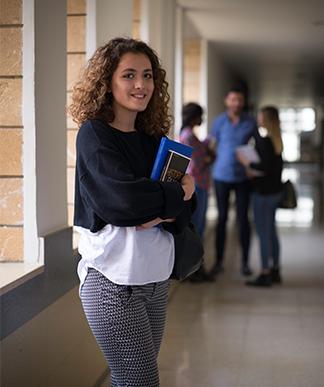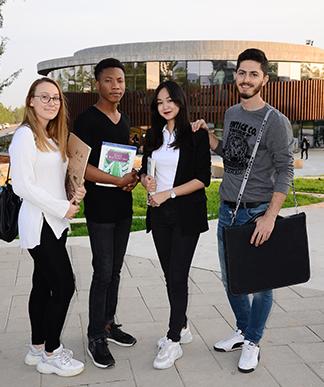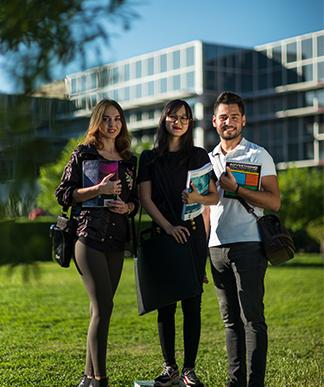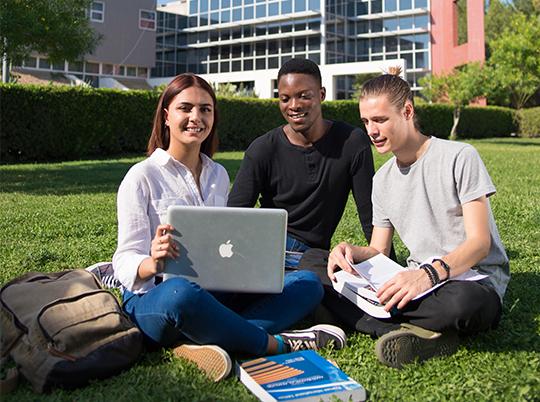


About the Program
The M.A. in ELT Program, which is accredited by the Higher Education, Planning, Accreditation and Coordination Council (Northern Cyprus) and the Higher Education Council of the Turkish Republic provides graduate students with the opportunity to specialize in the teaching of English in primary schools, secondary schools and higher education institutions. The program aims to enable graduate students to:
-enhance their teaching skills in ELT,
-improve their knowledge and skills in ELT syllabus design,
-study and evaluate current second language research studies,
-gain the competence needed to carry out necessary studies for the improvement of the quality of English Language Teaching,
-learn the most recent advances in the methods of foreign and second language teaching,
-design and evaluate new techniques and classroom activities in teaching English.
Education Opportunities
The M.A. in ELT Program of the Institute of Graduate Studies and Research, CIU hosts students from diverse countries. All classrooms used for the M.A. in ELT program are equipped with interactive touch panel boards, which provide web-based resources and contribute to the enhancement of learning. The university library has a special unit for ELT books and related resources. In addition to the department courses, students of the program benefit from diverse lectures, workshops and seminars delivered by ELT experts. Students have the opportunity to participate in student engagement projects or some other extracurricular activities that they would enjoy.

Career Areas
The M.A. in ELT graduates can work in the fields of curriculum development, teacher training, administration, and materials writing as well as in the field of teaching English as a foreign or second language at private or state schools and especially at higher education institutions. M.A. in ELT graduates have the opportunity to enroll in a Ph.D. program and to carry out further study in the field of ELT.ay.
Contact
Institute of Graduate Studies and Research
Graduate Sciences and Education Center, GE106
Tel: +90 392 671 1111 Extension: 2776
Institute E-mail: ciu-institute@ciu.edu.tr
Compulsory Courses
First Semester
SECOND LANGUAGE ACQUISITION
Course code
ELTE502Credit
3Theoretical
3Practical
0Ects
8TEFL METHODOLOGY
Course code
ELTE505Credit
3Theoretical
3Practical
0Ects
8SEMINAR
Course code
ELTE590Credit
0Theoretical
3Practical
0Ects
4ELECTIVE
Course code
ELTE5X1Credit
3Theoretical
3Practical
0Ects
8ELECTIVE
Course code
ELTE5X2Credit
3Theoretical
3Practical
0Ects
8ELECTIVE
Course code
ELTE5X3Credit
3Theoretical
3Practical
0Ects
8ELECTIVE
Course code
ELTE5X4Credit
3Theoretical
3Practical
0Ects
8ELECTIVE
Course code
ELTE5X5Credit
3Theoretical
3Practical
0Ects
8Second Semester
THESIS
Course code
ELTE500Credit
0Theoretical
0Practical
0Ects
60Elective Courses
TEACHING ENGLISH TO YOUNG LEARNERS
Course code
ELTE516Credit
3Theoretical
3Practical
0Ects
8CURRICULUM DESIGN AND EVALUATION
Course code
ELTE511Credit
3Theoretical
3Practical
0Ects
8LANGUAGE TESTING
Course code
ELTE506Credit
3Theoretical
3Practical
0Ects
8APPLIED LİNGUISTICS FOR LANGUAGE TEACHERS
Course code
ELTE521Credit
3Theoretical
3Practical
0Ects
8RESEARCH METHODS IN ELT
Course code
ELTE513Credit
3Theoretical
3Practical
0Ects
8DISCOURSE ANALYSIS
Course code
ELTE509Credit
3Theoretical
3Practical
0Ects
8LITERATURE IN TEFL
Course code
ELTE510Credit
3Theoretical
3Practical
0Ects
8SHORT STORY ANALYSIS
Course code
ELLE509Credit
3Theoretical
3Practical
0Ects
8LITERARY AND CULTURAL STUDIES
Course code
ELLE502Credit
3Theoretical
3Practical
0Ects
8TEACHING LANGUAGE SKILLS I
Course code
ELTE333Credit
0Theoretical
0Practical
0Ects
METHODOLOGY I
Course code
ELTE254Credit
0Theoretical
0Practical
0Ects
3SPECIAL STUDIES I
Course code
ELTE570Credit
3Theoretical
3Practical
0Ects
8LITERATURE AND LANGUAGE
Course code
ELLE501Credit
3Theoretical
3Practical
0Ects
8TEACHING LANGUAGE SKILLS II
Course code
ELTE334Credit
0Theoretical
0Practical
0Ects
METHODOLOGY II
Course code
ELTE323Credit
0Theoretical
0Practical
0Ects
STYLISTICS
Course code
ELLE505Credit
3Theoretical
3Practical
0Ects
8LANGUAGE ACQUISION
Course code
ELTE208Credit
0Theoretical
2Practical
0Ects
PRINCIPLES OF TEACHING AND LEARNING
Course code
ELTE201Credit
0Theoretical
2Practical
0Ects
APPROACHES TO ELT I
Course code
ELTE233Credit
0Theoretical
0Practical
0Ects
ENGLISH TEACHING PROGRAMS
Course code
ELTE202Credit
0Theoretical
2Practical
0Ects
3FOUNDATIONS OF LINGUISTICS
Course code
ELTE518Credit
3Theoretical
3Practical
0Ects
8METHODOLOGY-II
Course code
ELTE323Credit
0Theoretical
0Practical
0Ects
6TEACHING ENGLISH LANGUAGE SKILLS-II
Course code
ELTE304Credit
0Theoretical
3Practical
0Ects
4TEACHING ENGLISH TO YOUNG LEARNERS-I
Course code
ELTE301Credit
0Theoretical
3Practical
0Ects
BRITISH DRAMA FROM 1950 TO THE PRESENT
Course code
ELLE512Credit
3Theoretical
3Practical
0Ects
8PRAGMATICS AND LANGUAGE TEACHING
Course code
ELTE524Credit
3Theoretical
3Practical
0Ects
8SATIRE IN ENGLISH LITERATURE
Course code
ELLE515Credit
3Theoretical
3Practical
0Ects
8TEFL METHODOLOGY
Course code
ELTE505Credit
3Theoretical
3Practical
0Ects
8BRITISH - IRISH DRAMA
Course code
ELLE511Credit
3Theoretical
3Practical
0Ects
8TEACHING ENGLISH TO YOUNG LEARNERS-II
Course code
ELTE302Credit
0Theoretical
3Practical
0Ects
ENGLISH PHONETICS AND PHONOLOGY
Course code
ELTE501Credit
3Theoretical
3Practical
0Ects
8LITERATURE AND MEDIA
Course code
ELLE522Credit
3Theoretical
3Practical
0Ects
8APPROACHES TO ELT II
Course code
ELTE234Credit
0Theoretical
0Practical
0Ects
COMPARATIVE NOVEL
Course code
ELLE504Credit
3Theoretical
3Practical
0Ects
8COMARATIVE DRAMA
Course code
ELLE506Credit
3Theoretical
3Practical
0Ects
8SCIENCE FICTION FILM AND LITERATURE
Course code
COMM531Credit
3Theoretical
3Practical
0Ects
10LISTENING AND PRONUNCIATION II
Course code
ELTE106Credit
0Theoretical
2Practical
0Ects
DEVELOPING COURSE CONTENT IN ELT
Course code
ELTE453Credit
0Theoretical
0Practical
0Ects
6Students who are interested in pursuing advanced graduate studies leading to a master’s, doctoral degree, or professional doctorate degree for the Fall and Spring semesters every year. Applicants can directly apply online to our graduate programs using the application portal.
TR Applicants- Required documents:
- Bachelor’s Degree Diploma
- Bachelor’s Degree transcripts for each completed academic term/year.
- Valid ALES result document (must not exceed 5 years),
- Documents to prove English proficiency for English language departments,
- Scanned copy of passport or identity card.
Click for detailed admission requirements information.
TRNC Applicants- Required documents:
- Bachelor’s Degree Diploma
- Bachelor’s Degree transcripts for each completed academic term/year.
- Documents to prove English proficiency for English language departments,
- Scanned copy of passport or identity card.
Click for detailed admission requirements information.
Students who are interested in pursuing advanced graduate studies leading to a master’s, doctoral degree, or professional doctorate degree for the Fall and Spring semesters every year. Applicants can directly apply online to our graduate programs using the application portal.
International Applicants- Required documents;
- Bachelor’s Degree Diploma
- Bachelor’s Degree transcripts for each completed academic term/year.
- Evidence of English Language competence: TOEFL (65 IBT) or IELTS (5.5). Students without these documents will take the CIU English proficiency exam on campus following arrival.
- Scanned copy of international passport/birth certificate
- CV
- Fully completed and signed CIU Rules and Regulations document (which can be downloaded during the online application)
Click for detailed admission requirements information.
Cyprus International University provides academic scholarships for its students as an incentive for success, with most students benefiting from 50%, 75% or 100% scholarships or discounted tuition fees. Click for more information.
Tuition Fees are determined at the beginning of each academic year. Candidate students who are entitled to enroll in CIU can learn their fees in line with the Tuition Fee Calculation system.